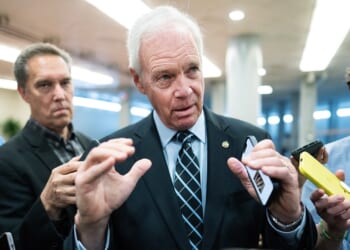Great power competition is mushrooming beyond the old domains of land and warfare; it’s in the world of cryptocurrencies as well.
The government shutdown has an unlikely casualty: cryptocurrency policy.
You would think that because decentralization is a core pillar of cryptocurrency, advocates would be thrilled by the federal shutdown. But for innovators, investors, and consumers in the crypto space, the operational blackout in Washington, D.C., is really a halt on progress and market confidence.
Federal shutdowns obstruct the policy infrastructure that supports a variety of governmental functions. With no spending legislation to fund agencies and programs, nonessential services pause, resulting in mass disruption — like missed paychecks and delayed regulatory actions. These pauses have far-reaching impacts on key sectors across the board, especially in tech, innovation, and financial regulations. Finance regulators reduce their tasks to respond only to urgent enforcement mechanisms. Other routine functions, like rule-making, registrations, and guidance, are all postponed. This delay in governance puts digital asset firms in a regulatory limbo, as they await determinations on listings, classification, and custody models, among other critical decisions.
Shutdowns stall the legislative process as well. For example, committee work, markups, and floor scheduling for market structure proposals like the CLARITY Act get postponed too. This narrows the timeframe for bipartisan negotiation and raises the risk that critical action items get pushed back into the next legislative session.
The effect is cumulative. Staff attention begins to turn from more forward-looking policy development to maintenance, thereby halting the transition from consensus into actionable regulation. And with a delay to a competitive framework, US companies may relocate abroad, and talent will eventually flow to markets that offer the certainty they need to flourish.
This risks more than lost jobs; it undermines our ability to shape global standards and to ensure that financial infrastructure continues to be built upon American values: transparency, accountability, and the rule of law.
The State of the CLARITY Act
On July 17, the House passed its market structure bill, the Digital Asset Market Structure Clarity (CLARITY) Act, with remarkable bipartisan consensus — 78 Democrats and 216 Republicans voting in favor.
The Act was expected to be taken up by the Senate Banking Committee in September, but the shutdown compounded delays. Senate Republicans have affirmed that they can bring forward crypto market structure legislation by the end of the year. But a bipartisan divide, disagreement over regulatory governance between the SEC and CFTC, and differing visions for how to regulate decentralized finance as an industry have stalled consensus on CLARITY.
The CLARITY Act would establish a framework for digital asset market structure, which includes the ecosystem governing the management and trading of crypto. More specifically, the act would provide guidelines on the SEC’s and CFTC’s governance mechanisms and would distinguish between different types of crypto products — digital commodities (which are exchanged like raw materials) and digital securities (which represent shares of a company).
However, legislation is only the start. Cohesive oversight mechanisms are needed to properly regulate a variety of digital asset products. Joint cooperation between the private sector and policymakers is a prerequisite for ensuring that regulation accurately reflects this need. A consensus for digital asset oversight between the SEC, CFTC, Treasury, and state regulators is also a critical layer to prevent overlapping and conflicting rules that can further fragment regulatory objectives and push innovation offshore.
Without the CLARITY Act in full force, builders, investors, and businesses will eventually halt their operations in the United States and move offshore to more promising regulatory environments.
A Digital Great Power Competition Grows
A prolonged US shutdown and the stalling of the CLARITY Act will have an impact far beyond Washington. The United States plays a central role in shaping global financial governance through watchdogs and bodies like the Financial Stability Board, IOSCO, and the FATF. When these institutions go quiet, regulatory momentum begins to fragment, creating space for other jurisdictions to fill.
For example, the EU continues to advance its MiCA regulation, setting disclosure, custody, and reserve standards for issuers. The UK is implementing a regime that integrates crypto activities under its financial services perimeter. Singapore, Hong Kong, and the UAE are positioning themselves as growing crypto hubs by offering licensing clarity and incentives to attract talent and capital. In these pro-business growth environments, regulatory arbitrage begins to speed up: issuers, liquidity pools, and companies begin to relocate to jurisdictions with operational frameworks and a collaborative environment.
These dynamics are not occurring in a geopolitical vacuum. Great power competition is playing out in financial innovation and in standard settings. China has advanced its digital yuan (e-CNY) pilot into cross-border settlement experiments through the mBridge project with Hong Kong, Thailand, and the UAE. This initiative is a competitor to a SWIFT-dominated payment infrastructure. While China maintains a ban on crypto trading, it uses state digital currency development to project its financial influence abroad, particularly across developing economies in the Global South.
Facing financial sanctions, Russia has pursued a different strategy by leveraging cryptocurrency channels and exploring a state-backed digital ruble to bypass Western payment systems and form economic ties with unaligned partners. These approaches showcase that rival powers, such as China and Russia, view digital assets and programmable money not just as financial tools but as instruments of geopolitical leverage.
As the United States remains gridlocked amidst a government shutdown and delays on crafting a fundamental market structure framework, it risks ceding leadership in setting the norms around market integrity, disclosure, stablecoin oversight, and cross-border payments. The absence of clear regulation creates space for authoritarian governments to gain ground in the industry.
Over time, this competition could marginally erode the global reach of the dollar, especially in the context of emerging market remittances and alternative settlement networks. A United States pause doesn’t pause the world, and it shifts the momentum of innovation and influence toward jurisdictions whose strategic priorities diverge from democratic norms.
About the Author: Emily Vartuhi
Emily Vartuhi is a Young Voices contributor based in Washington, DC. She is a graduate of the Columbia University Graduate School of Journalism MS program. Emily writes on the emerging technologies sector, such as digital asset policy, blockchain, AI and tech use-cases for public good.
Image: Shutterstock/CineVI
















